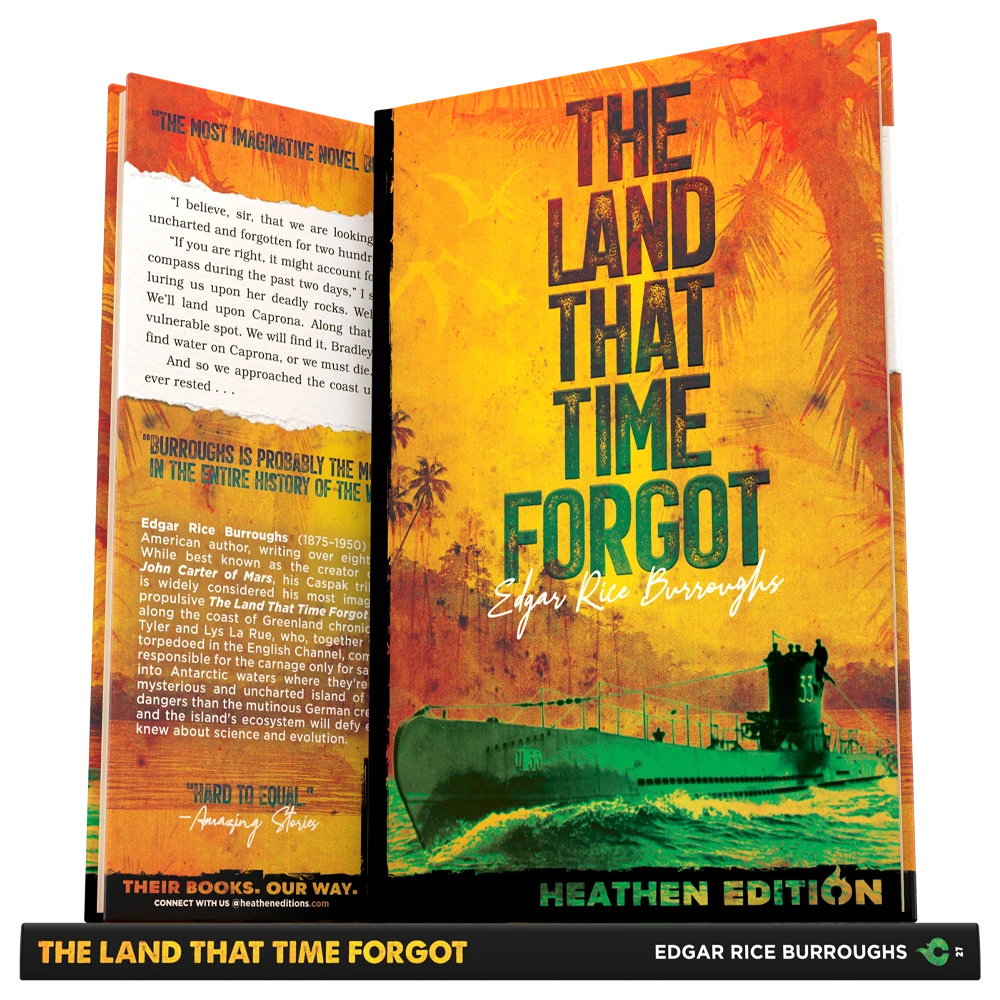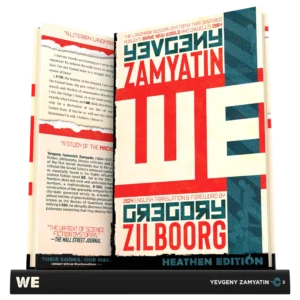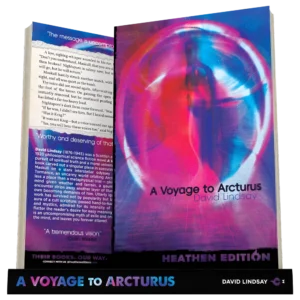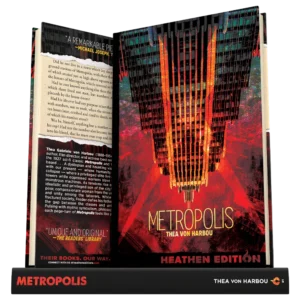No products in the cart.

The Land That Time Forgot
Spine #27
Author
Edgar Rice Burroughs
Translator
First Edition
1918
Heathen Edition
February 5, 2022
Refreshed
November 29, 2022
Pages
130
Heathen Genera
Hi-Sci-Fi
Paperback ISBN
978-1-948316-27-9
Hardcover ISBN
978-1-963228-27-4
"I believe, sir, that we are looking upon the coast of Caprona, uncharted and forgotten for two hundred years."
"If you are right, it might account for much of the deviation of the compass during the past two days," I suggested. "Caprona has been luring us upon her deadly rocks. Well, we’ll accept her challenge. We’ll land upon Caprona. Along that long front there must be a vulnerable spot. We will find it, Bradley, for we must find it. We must find water on Caprona, or we must die."
And so we approached the coast upon which no living eyes had ever rested . . .
Edgar Rice Burroughs (1875–1950) was a legendarily prolific American author, writing over eighty books in thirty-six years. While best known as the creator of Tarzan of the Apes and John Carter of Mars, his Caspak trilogy, first serialized in 1918, is widely considered his most imaginative. Beginning with the propulsive The Land That Time Forgot, the recovery of a manuscript along the coast of Greenland chronicles the exploits of Bowen J. Tyler and Lys La Rue, who, together with other survivors of ships torpedoed in the English Channel, commandeer the German U-boat responsible for the carnage only for saboteurs to send them drifting into Antarctic waters where they’re drawn magnetically to the mysterious and uncharted island of Caprona. There, far greater dangers than the mutinous German crew will threaten their survival, and the island’s ecosystem will defy everything they thought they knew about science and evolution.
Test Your Might
Paperback
OTHER RETAILERS
Rate & Shelve It
Hardcover
OTHER RETAILERS
Rate & Shelve It
"Burroughs is probably the most influential writer in the entire history of the world."
Ray Bradbury
Heathenry
Contents
Praise
Details
Heathenry
Edgar Rice Burroughs was a man of action. Evidenced not only by his primary literary genre but in life as well. After reading the pulp stories of his contemporaries, he is known to have said, “…if people were paid for writing rot such as I read in some of those magazines, that I could write stories just as rotten. As a matter of fact, although I had never written a story, I knew absolutely that I could write stories just as entertaining and probably a whole lot more so.”
And so he did, becoming wildly successful as a result, birthing characters like Tarzan and John Carter who are still with us a century later. What’s more, he was entirely self-taught! “In all these years I have not learned one single rule for writing fiction. I still write as I did 30 years ago; stories which I feel would entertain me and give me mental relaxation, knowing that there are millions of people just like me who will like the same things I like.” There exists a writing maxim—never be boring—and Burroughs certainly abided by it. The proof awaits you in the pages ahead.
As for the text, Burroughs’ pulp style lends itself pleasingly to modern eyes, so we’ve kept our Heathening to a minimum. The bulk of our work is focused on the footnotes, which will surely prove useful as you navigate this science-heavy tale.
Bon voyage!
Contents
Map of Caspak
Heathenry: A Note on the Text
The Land That Time Forgot
Genealogical Epochs
Heathenry: A Note on the Text
The Land That Time Forgot
Genealogical Epochs
Praise
“Burroughs is probably the most influential writer in the entire history of the world.” –Ray Bradbury
“Perhaps the most imaginative single novel Burroughs ever wrote is the one you are holding in your hands right now: The Land That Time Forgot.” —Mike Resnick
” . . . considered the most noteworthy of Burroughs’ singles. The novel, one of the author’s longest, was written in the fiercely chauvinistic atmosphere of WWI but contains sheer, headlong adventure that is unusual even for an ERB thriller.” —Floyd C. Gale, Galaxy Science Fiction
“For downright originality and exciting interest, The Land That Time Forgot is hard to equal. There is hardly a page that does not hold your interest . . . Burroughs has such a tremendous imagination.” —Amazing Stories
” . . . The Land That Time Forgot, regarded by many as Edgar Rice Burroughs’ finest imaginative work.” —Fantasy: The 100 Best Books
“Among the best of Burroughs’ non series titles . . . Written during the early months of America’s involvement in World War I—and fueled by Burroughs’ strong anti-German prejudices . . . His fertile imagination inspired such award-winning writers as Ray Bradbury, among others.” —Marie J. MacNee, Science Fiction, Fantasy, and Horror Writers
“Many readers consider Burroughs’ best novel to be The Land That Time Forgot . . . The beginning of the story contains echoes of both Poe and Conan Doyle.” —Brian W. Aldiss, Billion Year Spree: The True History of Science Fiction
Details
The Land That Time Forgot
Heathen Edition #27Format: Paperback
Interior: Black & White on Cream Paper
Pages: 130 (+2 POD)
Language: English
Annotations: 86 Footnotes
Illustrations: 5
The Heathen Newsletter
Want to be kept in the loop about new Heathen Editions, receive discounts and random cat photos, and unwillingly partake in other tomfoolery? Subscribe to our newsletter! We promise we won’t harass you – much. Also, we require your first name so that we can personalize your emails. ❤️
@heatheneditions #heathenedition
Copyright © 2026 Heathen Creative, LLC. All rights reserved.




